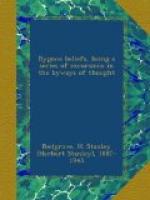However, it would, I think, be unwise to disregard the existence of another side to the question of the validity and ethical value of magic, and to use the word only to stand for something essentially evil. SWEDENBORG, we may note, in the course of a long passage from the work from which I have already quoted, says that by “magic” is signified “the science of spiritual things"[1] His position appears to be that there is a genuine magic, or science of spiritual things, and a false magic, that science perverted: a view of the matter which I propose here to adopt. The word “magic” itself is derived from the Greek “magos,” the wise man of the East, and hence the strict etymological meaning of the term is “the wisdom or science of the magi”; and it is, I think, significant that we are told (and I see no reason to doubt the truth of it) that the magi were among the first to worship the new-born CHRIST.[2]
[1] Op. cit., SE 5223.
[2] See The Gospel according to MATTHEW, chap. ii., verses 1 to 12.
If there be an abuse of correspondences, or symbols, there surely must also be a use, to which the word “magic” is not inapplicable. As such, religious ritual, and especially the sacraments of the Christian Church, will, no doubt, occur to the minds of those who regard these symbols as efficacious, though they would probably hesitate to apply the term “magical” to them. But in using this term as applying thereto, I do not wish to suggest that any such rites or ceremonies possess, or can possess, any CAUSAL efficacy in the moral evolution of the soul. The will alone, in virtue of the power vouchsafed to it by the Source of all power, can achieve this; but I do think that the soul may be assisted by ritual, harmoniously related to the states of mind which it is desired to induce. No doubt there is a danger of religious ritual, especially when its meaning is lost, being engaged in for its own sake. It is then mere superstition;[1] and, in view of the danger of this degeneracy, many robust minds, such as the members of the Society of Friends, prefer to dispense with its aid altogether. When ritual is associated with erroneous doctrines, the results are even more disastrous, as I have indicated in “The Belief in Talismans”. But when ritual is allied with, and based upon, as adequately symbolising, the high teaching of genuine religion, it may be, and, in fact, is, found very helpful by many people. As such its efficacy seems to me to be altogether magical, in the best sense of that word.
[1] As “ELIPHAS LEVI” well says: “Superstition . . . is the sign surviving the thought; it is the dead body of a religious rite.” (Op cit., p. 150.)




